The Best Self Storage Software
Move beyond paper records and spreadsheets with software designed to streamline facility operations and tenant communications. We assessed the top platforms for features like easy payment processing and tenant management tools.
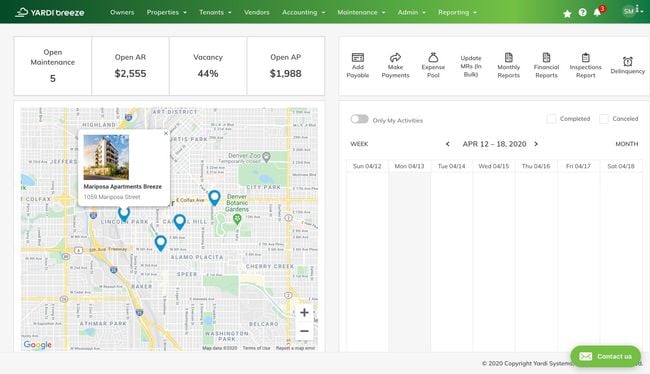
- Available for mobile use anywhere
- Cuts down on time-consuming tasks
- Integrated property management and accounting
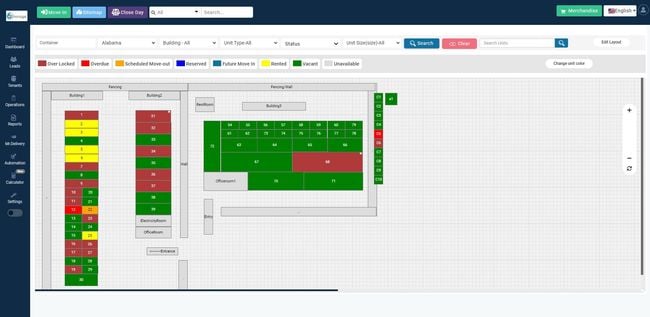
- Full automation with modern architecture
- Scalable with easy data migration
- User-friendly interface
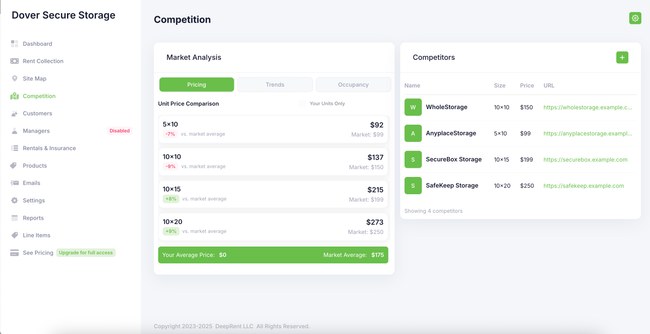
- Affordable and transparent pricing
- Dynamic rent pricing
- 24/7 customer service
We evaluated these solutions for a variety of self-storage facilities, from small single-building operations to large climate-controlled operations. Our review considers features like automated billing, virtual unit maps, and online booking tools that adapt to any size self-storage business.
- Yardi Breeze: Best for Mid-Sized Facilities
- 6Storage: Best for Small Facilities
- Landlord Software: Best for Competitor Tracking
- Storable Edge: Best for Remote Facilities
- Unit Trac: Best for Facility Mapping
- Storeganise: Most Customizable
Yardi Breeze - Best for Mid-Sized Facilities
Yardi Breeze provides automated marketing tools, helping larger self-storage companies manage multiple listings across platforms. You can access all your unit listings from a single interface; when you make price adjustments or other changes, this system automatically adjusts listings across all connected ILS platforms and sites, like StorageCafe.com.
Additionally, you can customize your listings extensively. Write descriptions highlighting sizes and any amenities offered. Upload multiple images and define custom attributes for each unit, including security measures, climate control, or accessibility features. Last, set promotional offerings and competitive pricing and let the software adjust rates dynamically based on market conditions.
After syndication, Yardi Breeze analyzes listing performance so you can track views and leads. This gives you insights into shaping your future advertising strategies. Track key performance metrics:
- Lead Generation: Monitor the number of inquiries different listing platforms generate to determine which sites are most effective in attracting tenants.
- Marketing Campaign Performance: Assess the effectiveness of different marketing campaigns to get a clear overview of ROI and refine your efforts.
- Conversion Rates: See how many leads convert to actual rentals so you can pinpoint potential bottlenecks in your marketing funnel.
Yardi Breeze starts at a minimum of $400 per month when billed annually. The actual cost varies based on the number of units you manage and any specific services you require.
6Storage - Best for Small Facilities
6Storage is a cost-effective option, starting at $39.99 per month with a charge of $0.40 for each storage unit. This pricing structure is designed for smaller business budgets. A one-time setup fee of $275 gives you access to features that can boost your operations without adding to administrative tasks, like an online rental system.
The software includes a user-friendly interface for potential tenants; you can customize the portal with messaging, branding, and your preferred payment options, like Stripe, eMerchant, or ACH. Customers can filter storage units by desired size, location, and monthly rate. From there, they can confirm their move-in date and invoice period, whether on a monthly or annual basis.
6Storage automatically generates a lease agreement with your customer’s personal information, identity verification, and any unit specifics. Your tenants can sign and pay for the lease online, saving your company time and effort in managing paperwork and correcting errors. From that point on, the portal serves as a personal dashboard for your tenants, where they can view lease agreements and update their personal info.
While the portal features a mobile-first design, 6Storage does not have a dedicated mobile app. This may limit on-the-go access for some facility managers, though 6Storage does have a responsive web design accessible via mobile browsers.
Landlord Software - Best for Competitor Tracking
Landlord Self Storage Software sets itself apart with its market insights tool, giving self-storage operators visibility into nearby competitors’ pricing and availability. The tool pulls live data from surrounding self storage facilities and presents it in a simple dashboard, helping owners make informed pricing decisions to stay competitive in local markets.
You can track historical trends, filter competitors by unit size or type, and receive alerts when nearby rates change. Combined with automated rate management tools, Landlord Software allows operators to respond to market shifts proactively, without falling behind local competitors.
In addition to competitor tracking, Landlord Software includes core property management features like online rentals, automated billing, and integration with leading accounting and gate control providers. Pricing starts at just $75/facility/month. However, the competitor tracking tools are only available in the Semi-Automated plan starting at $104/month.
Storable Edge - Best for Remote Facilities
Storable Edge, formerly StorEDGE, includes a strong customer relationship management system, ideal for managing remote or semi-manned facilities. This system reduces the need for on-site employees, allowing you to communicate with tenants and collect payments from a centralized platform.
The CRM tool includes automated messaging triggered by newly-signed leases, rent-due alerts, and delinquency warnings. You can even configure these based on your preferences, like using email for policy changes or SMS for overdue payment notices. Additionally, tenants can reply directly to SMS communications with two-way texting. The software automatically records these responses, so you can respond to questions or requests and manage them right from the CRM dashboard.
Edge provides comprehensive tenant interaction logging for other activities, such as rate adjustments, notices, and failed payments. Set up automated delinquency notices and reminders for missed payments. The system records each interaction, creating a reliable history for each tenant and making it easier for remote facilities to manage efficiently.
Unit Trac - Best for Facility Mapping
Unit Trac includes an intuitive site map that helps manage the day-to-day management of self-storage facilities. The interactive facility map gives you a real-time color-coded overview of each unit’s status, whether it’s occupied, vacant, past due, or reserved. And the map isn’t just visual, it’s functional. You’re able to access important information like lease information and handle simple tasks like assigning units for move-ins and invoicing customers for monthly rent without switching between modules.
The system was designed to minimize manual tasks by supporting automated invoicing, scheduled payment reminders, and an online payment portal. With this portal, tenants can rent units online, sign leases electronically, and access a self-service portal to review payment history and manage billing information.
While UnitTrac does provide access to a custom website to host your listing online, they don’t offer advanced marketing tools or automations that other leading systems like Storable Edge can provide. But with a starting minimum price of $30/month with a $0.70 per unit fee, UnitTrac is a great option for larger-scale facilities or lightly-staffed operations needing a visual, real-time map.
Storeganise - Most Customizable
Storeganise includes several customization features that help automate and tailor the system to fit your business. For example, you can create custom fields to pretty much any module, like extra tenant details, lead sources in the CRM, or specialized unit types. And for emails and invoices, it lets you include your branding and format templates to show the info you want. This way, regardless of what data you need on the system, you can add it.

Another way Storeganise lets you customize the platform is through its Open API. This is a great option if you’re particularly tech-savvy and want to build your own custom integrations. It has add-ons in its marketplace for platforms like Xero and Hubspot, but if a platform you use isn’t on there, the API accommodates this.
Storeganise features several other customization features, like a marketing website, no-code automations, and editable reports. Because of this, if you’re looking for something more standardized, 6Storage or Yardi Breeze may be better fits. Pricing for Storeganise starts at 90/month billed annually for 1-100 units, and increases by about $10/month for each additional 10 units.
Systems We Don’t Recommend
-
QuickBooks Online: QuickBooks is a great accounting system that many self-storage businesses use to manage their finances. However, it does not offer facility management tools like a unit map, gate access control, or online booking support. Users should integrate it with other systems on this list to make QuickBooks viable.
-
RealPage Commercial: RealPage Commercial is a property management software specialized for commercial rental and mixed-use properties. It offers tools tailored to the commercial property industry, like tracking and automating CAM (common area maintenance) fees that self-storage managers will never utilize. Commercial property management helps properties like office buildings and retail centers, not self-storage units.
What is Self-Storage Software?
Self-storage software allows facility managers to track vacant and occupied storage units, monitor facility access, and automate invoicing. These systems often feature interactive facility maps that show the status of each storage unit—whether it’s vacant, has overdue rental payments, or is occupied and in good standing. The unit status is shown in real time, so you always know the current status for marketing or payment collection purposes.
Many self-storage software vendors also offer website design services. Their websites are designed to integrate with their software solutions, which allows self-storage facility owners to accept online applications and electronic signatures and collect payments. A tenant portal is often included for tenants to view their account information and set up recurring payments.
The software often integrates with various types of hardware and software to help you manage all of your self-storage operations. Some common integrations include:
- Gate Control Systems
- Accounting Software like QuickBooks
- Credit Card Processors
- Driver’s License Scanners
Key Features
| Feature | Description |
|---|---|
| Online Payment Processing | Accept tenant payments via ACH bank account transfers or credit cards. Tenants can setup recurring payments to be made to avoid late fees. |
| Online Reservations | Give tenants access to real-time storage unit availability and reserve their unit online. Collect electronic signatures for facility contracts. |
| Invoicing | Automatically send invoices via paper mail or email. Set a schedule for recurring invoices to be sent out at specific times. |
| Auction Manager | Track the number of days the rent is past due and flag the unit for auction after a set amount of time. Send warnings about late payments, market upcoming auctions, and schedule the auctions. |
| Facility Maps | Create interactive facility maps that show you the locations, specifications, and availability of your storage units. |
| Customer Relationship Management (CRM) | Maintain tenant contact and payment information and signed contracts, as well as contact information for new leads. Communicate with tenants via automated emails and text messaging. |
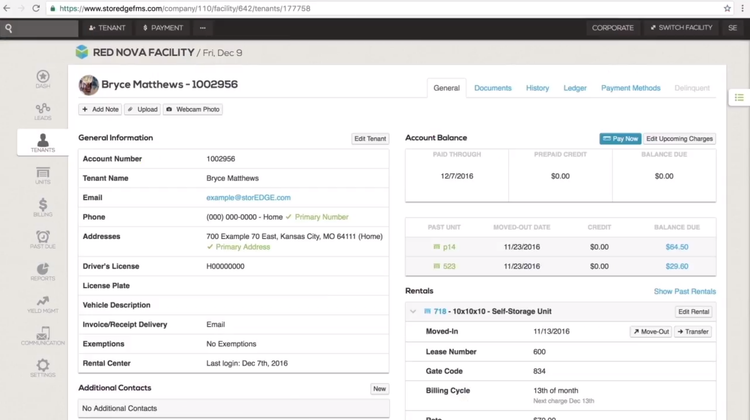
Benefits
Some of the benefits of implementing a self-storage solution include:
Reduced Overhead with Online Applications and Payment Processing
Self-storage management systems make it easy for tenants and new leads to submit their information online. Automating payment and application processes allows you to save time on unnecessary paperwork.
Existing tenants can sign up for access to the tenant portal, where they can make payments or update their contact information. Tenants can also set automatic recurring payments so they won’t have to worry about them down the road.
Self-storage systems process payments from various methods, including credit cards, electronic checks, and more. Some software solutions integrate with other payment processors, like PayPal, giving your tenants another secure way to pay their bills.
The software will automatically notify your tenants when a payment is due or late. The system can also automatically add late fees as needed.
New customers can apply for a storage unit through your website. The software will collect all information from the potential tenant including residence information and contact information. The applicant can also add driver’s license numbers for a background check. Potential tenants can choose their own move-in date and pick out a unit based on the website’s availability list. The system also collects electronic signatures for the lease contracts.
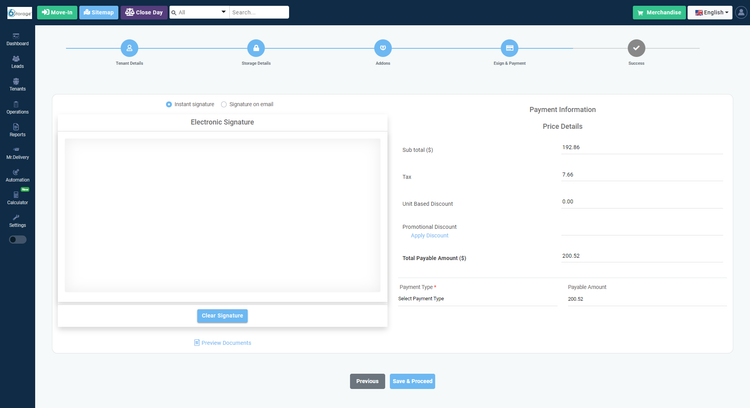
Better Access Control for Your Storage Facilities
Self-storage facility management software integrates with gate systems, allowing you to control access to the facility. PINs or passcodes can be set up to allow tenants access to the facility without the assistance of an employee. Cloud access control systems allow you to change a tenant’s permissions from anywhere. If a tenant is late on payments, the system can temporarily deny them access to the storage facility.
Self-storage software also provides you with data about who accessed the gate and when they accessed it. This allows you to monitor who is going in and out to ensure that only authorized personnel are using the facility.
Improved Insight into Unit Status with Interactive Facility Maps
The facility maps in self-storage software provide property managers with a detailed view of the facility layout and status of each storage unit. These maps are often color-coded to show whether a storage unit is in good standing, vacant, has past-due invoices, or has a lien. Being able to clearly see available and unavailable units makes it easy to assign vacant units to new customers. Units with overdue rental payments can have notifications sent to the customer automatically to prevent the unit from being auctioned off.
These interactive maps typically provide more information when a specific storage unit is selected. They provide information such as the tenant’s name and contact information, the price of the storage unit, and its dimensions.
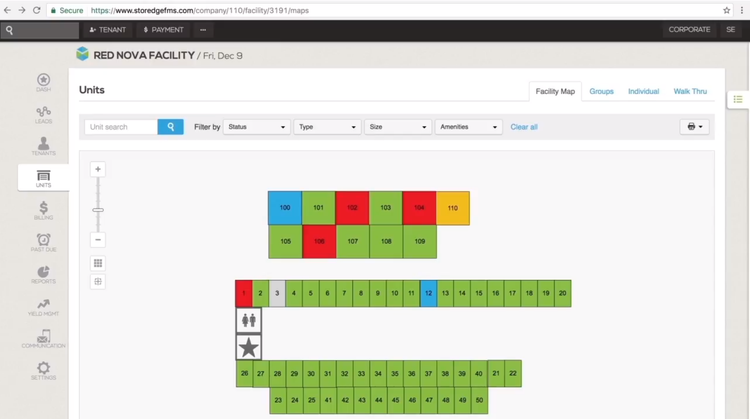
Pricing
Self-storage software pricing typically ranges from $1,500 to $10,000 per year with larger operations exceeding $100,000 per year. Actual costs depend on the number of facilities and units you manage. Most platforms follow a SaaS pricing model with monthly or annual billing cycles. Pricing often scales based on unit count, feature set, and number of facilities.
Below is a general pricing breakdown:
-
Low Tier ($1,500-$4,000/year): Designed for single-facility operators with up to 100 units. Products like UnitTrac and 6Storage offer core features like online rentals and invoicing at lower monthly costs.
-
Mid Tier ($4,000-$12,000/year): Suited for mid-sized businesses, managing 1-3 buildings and up to 500 units. Solutions like Storable Edge and Storable Easy may include features for more automation and CRM/marketing tools.
-
High Tier ($12,000-$40,000/year): Built for self-storage operators managing multiple locations with complex needs. Products in this range offer deep integrations with ERP systems, advanced reporting, and custom configurations.
-
Enterprise ($40,000-$200,000+/year): Designed for large, multi-state portfolios with thousands of units. These platforms often include advanced revenue management, call center tools, and ERP functionality.
Other Costs to Consider
- Credit Card Processing Fees: Many self-storage systems include integrated payment processing. Expect credit card transaction fees to range between 2.5% and 3.5% per transaction. Some vendors partner with specific processors while others may be processor-agnostic.
- Setup Fees: Many platforms charge a one-time onboarding or setup fee to cover initial data import, custom configuration, training, and website setup. These fees usually range from $250 to $5,000.
- Add-on or Optional Modules: For some vendors, not all features are included in the base price. Some common add-on services or features are: gate access integration, SEO marketing services, call center services, accounting/ QuickBooks integrations, and custom website development.
Is Self-Storage Software Free?
No, self-storage software is not typically offered for free. Some systems offer free trials or a free demo, but we have not found any systems offering a truly free self-storage software platform.
































